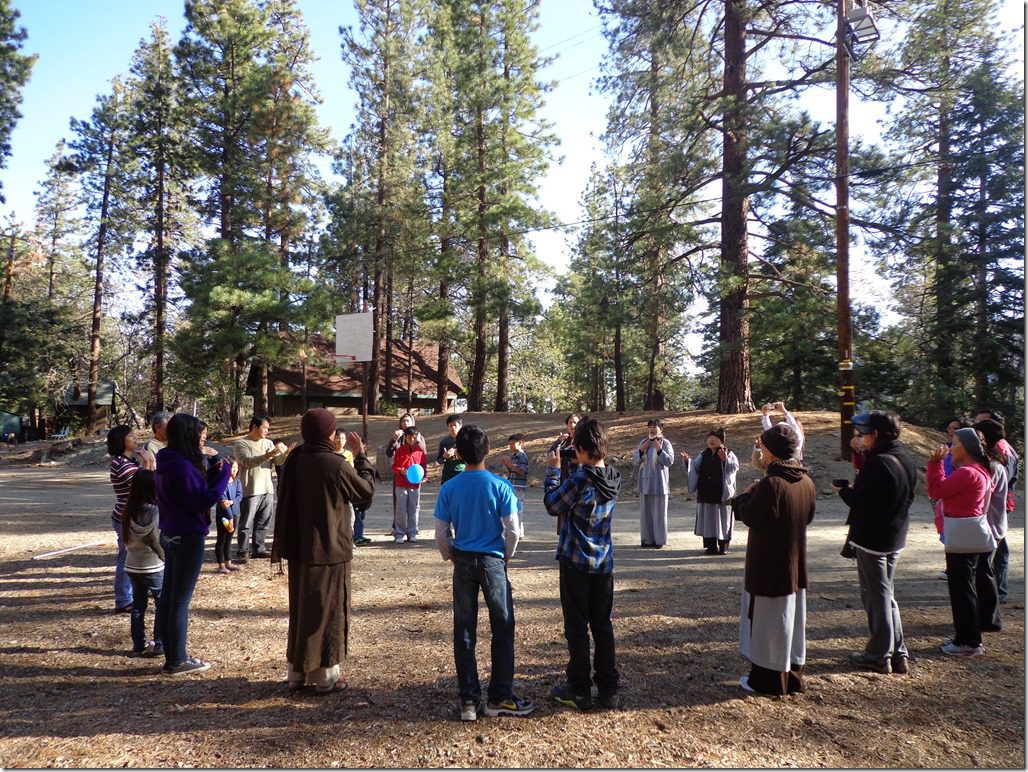To a certain degree, everybody in the world undergoes some kind of suffering in life. We suffer when our body hurts; anger causes suffering; regret also creates suffering. There are many sources of suffering, but, in the end, they all derive from ourselves.
Suffering is an obvious truth; no one can deny it. This is the first of the four Noble Truths in Buddhism. Anywhere in this world, even when we have money, education, prestige, or power, we are still dominated by suffering. So long as we do not recognize and transform the seeds of anger, greed, sadness, anxiety, fear, jealousy, and blame in our body and mind, it is easy for us to be bound and chained by these afflictions. However, the possibility of happiness, or the absence of suffering, is the second Noble Truth. If, right in this moment, we see clearly each event happening in our mind and our surrounding circumstances with an honest, clear, objective, state of mind, then suffering does not have the opportunity to manifest. In the Satipatthana Sutra, the Buddha taught:
“Here, Bhikkhus, a bhikkhu dwells perceiving again and again the body as just the body, with diligence, clear understanding and mindfulness, thus keeping away the covetousness and mental pain in the world; he dwells perceiving again and again the feelings as just the feelings, with diligence, clear understanding and mindfulness, thus keeping away the covetousness and mental pain in the world; he dwells perceiving again and again the mind as just the mind, with diligence, clear understanding and mindfulness, thus keeping away the covetousness and mental pain in the world; he dwells perceiving again and again the Dharmas as just the Dharmas, with diligence, clear understanding (awareness) and mindfulness, thus keeping away the covetousness and mental pain in the world.”
(MN: Vol. I).
The diligence mentioned in the above sutra is not the effort of a greedy ego. It only requires us to invest our attention in closely observing objective reality. Mindfulness means we do not forget reality or else we will be swayed by outside circumstances. Instead, we must always return to ourselves. Awareness means a clear, honest, objective view, unclouded by the maneuvers of consciousness or subjective thought.
Therefore, having diligence, awareness, and mindfulness to keep away worldly covetousness means that we only need to understand what is happening in our body and mind in the present situation and be fully present with it. We must recognize the present situation as it is and not add or subtract from it. Thus, we will not be bound by the Three Poisons, as identified by Buddha: greed, anger and ignorance.
Suffering begins with a mind that is either clinging to or averse to its object. On the contrary, when we get in touch with any situation and merely recognize it without covetousness or aversion, suffering will not have the basis for arising. Our true illness is coveting pleasant objects for the satisfaction of our senses and opposing or running away from we do not like. There is the cause of affliction and suffering. When we expect to attain anything, the greedy mind arises. When we dream of achieving something but fail, we will surely suffer (not getting what one desires is suffering); when we try to exclude what is unpleasant to us, the angry mind arises (coming into contact with the undesired is suffering), and if we want to but we are unable to abolish what is unpleasant, the suffering is even more intense. When we encounter unpleasant circumstances in daily life in this way, we will thus be immersed in suffering and instability.
Human beings are bound by suffering because we do not recognize how consciousness arises and operates. In fact, when sorrow emerges in our mind, we only need to see it clearly; calling it by its true name is enough: Hello, my friend Sadness, how are you? Please sit down and drink tea with me. Or when anger arises, we also call it by its true name: Hi, my dear friend Anger, are you trying to find me? Just like that, if we welcome our suffering joyfully, we have nothing to worry about. And when we co-exist peacefully and cheerfully with our suffering, and interact appropriately with it, there will be nothing unpleasant for us to fear or run away from.
A good example of this realization can be found in the story about a soldier returning to his village after the war. During the war, the soldier had spent days and nights climbing mountains, wading streams, and crossing forests, encountering numerous, great hardships. He ate uncooked meals, drank untreated river water, slept in the wilderness, spent days in rain and bad weather, never knowing when he might die by gunfire or bombs. After the war was over, he could return home to live peacefully in his village. Even if he occasionally encountered economic difficulty, it was nothing compared to the times when he was still in the battlefield facing immeasurable suffering. So suffering is not always the terrible thing that we must avoid, but it may rather be a teacher for us to realize the true value of our life. It is just like the lotus flower: it becomes beautiful and fragrant because it co-exists with the dirty, foul-smelling mud; without mud, how can there be lotus flowers? Therefore, mud is essential for lotus plants to produce fresh, lovely flowers as gifts to the world.
Reacting to and resisting objects of mind are due to the intervention of our ego. Such phenomena, also called dharmas, always operate according to the law of cause and effect. Something which is formed now depends on multiple causes from the past. For example, when someone suddenly scolds or slanders someone else for no apparent reason, people tend to react with self-justification, arguing to their heart’s content. But such a reaction cannot bring reconciliation and harmony for both parties, and often only creates more hatred. In such a situation, the better way is for us to just remain calm, and to recognize the feelings in our body and mind. That is enough. When our body and mind actually settle down, we will see the roots of the problem. We see that person had spoken falsely and used unkind words because he or she is suffering. One who is happy will never say anything negative to create suffering in others. Next, we see that a person who uses unkind speech lacks understanding and a clear mind because he or she follows the trail of the ego. Furthermore, we realize how much is actually due to our own weakness, as people may often say some unkind words to us for a few minutes, but we embrace our anger the whole day long. We are swayed by our emotions and dictated to by external circumstances, all from allowing our happiness to depend on each situation, so that when everything goes well, we are happy and things going badly triggers our suffering.
We must realize that sorrow, love, anger, intelligence, and virtue are universal characteristics, not reserved or prioritized for anyone. Why then do not we accept other people’s anger as well? We cannot expect others to behave only pleasantly to us when, in fact, sometimes we also have anger towards them. In reality there are always both negative and positive qualities in every individual. People with calm and clear minds know how to treat others with courtesy; people who live with delusion and are not mindful of reality usually experience sadness or happiness depending only on their external circumstances.
To transform suffering into happiness, we must constantly recognize what is happening in our body and mind, and see the present situation in a clear, objective, and honest way. We must not distort and impose upon reality based on our subjective perceptions. We need only to quietly observe the nature of birth and death, and the changing nature of all phenomena, which we see comes and goes just as when we observe a flowing river; in so doing, true peace and happiness will fully come into being within us.
Thich Vien Ngo


